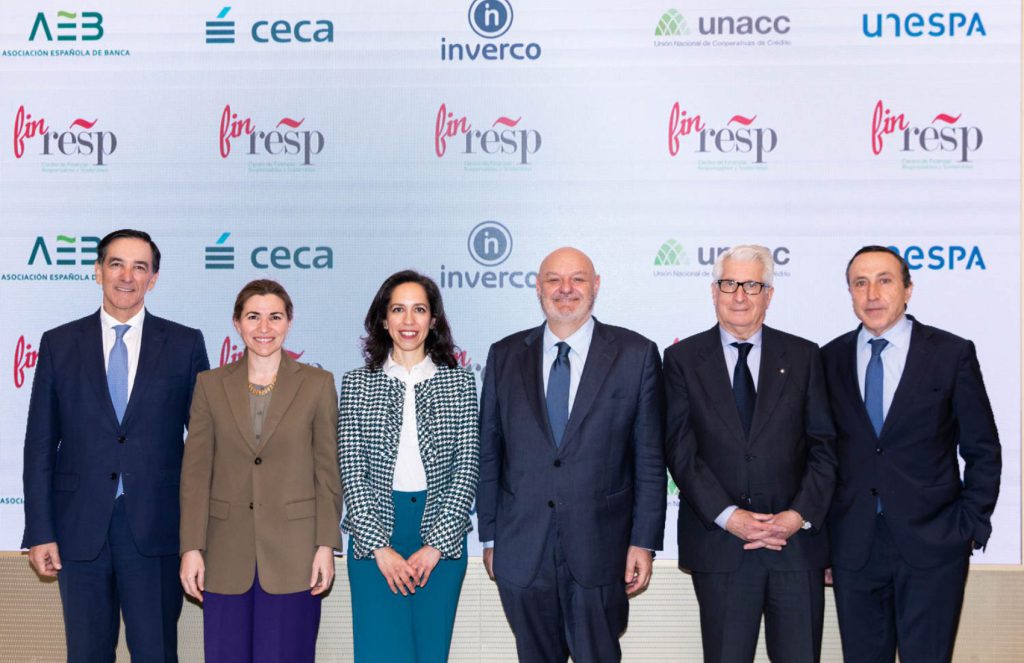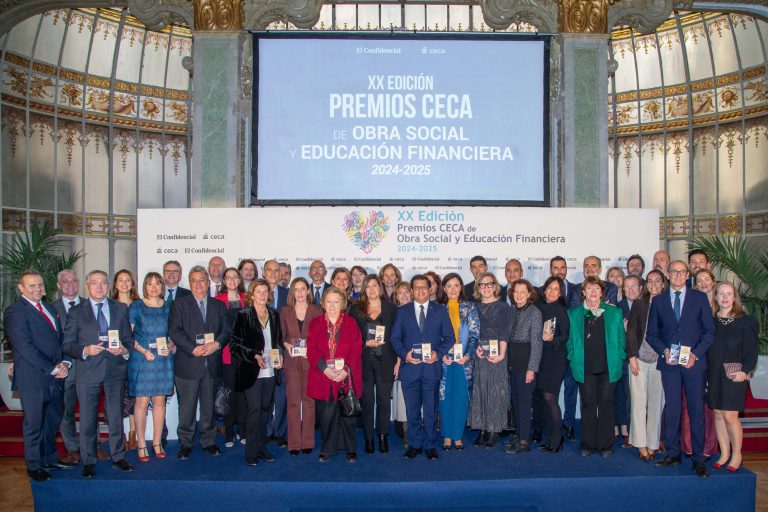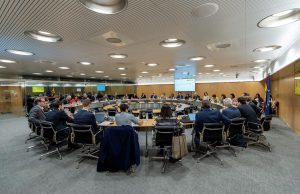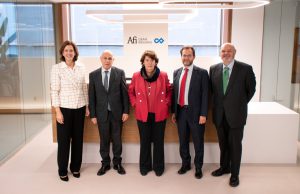Finresp's 5th Annual Meeting brought together representatives of financial institutions, legislators, supervisors and experts to discuss the current situation in sustainable finance
The seminar reflected on the role of European regulation and the alignment of decarbonisation and competitiveness in companies. There was also a focus on the importance of strengthening mechanisms against climate risk and the need to improve prevention and awareness
The seminar was attended by José Manuel Campa, Chairman of the EBA; Paloma Marín, Deputy Chair of the CNMV; Manuel Illueca, Chairman of the ICO; Ana Puente, Deputy Director of Sustainable and Digital Finance of the Ministry of Economy; Juan Carlos Delrieu, Director of the ESG Office of the Bank of Spain; Mª Àngels Ramón-Llin, Director General of Agricultural and Livestock Production of the Regional Government of Valencia; Gonzalo Gortázar, CEO of CaixaBank; César González-Bueno, CEO of Banco Sabadell; Ignacio Machetti, Chairman of Agroseguro; Marta Marín, CEO of Amundi Iberia; and Jesús Sánchez-Quiñones, CEO of Renta 4, among others
Finresp, the Centre for Responsible and Sustainable Finance in Spain, made up of the main associations in the financial sector – AEB, CECA, INVERCO, Unacc and UNSPAC – today held the 5th edition of its Annual Meeting, focused on the role of credit entities, insurance and investment in the transition to a sustainable economy. During the event, the speakers conveyed the sector's strong commitment to sustainability and advocated for simplifying and easing the regulatory burden in favour of Europe's competitiveness in the current international context, as European institutions are proposing.
The event served as a meeting point for the main financial institutions and entities to discuss sustainable finance, with a particular focus on regulation, climate risk and support for SMEs. The opening speech was given by José María Méndez, CEO of CECA and Chairman of Finresp, who welcomed the attendees, underlining the organisation's alignment with Europe's efforts to simplify sustainability regulations and reiterating “the sector's commitment to a sustainability approach that, beyond regulatory requirements, is seen as a factor boosting the production sector". "The current geopolitical context favours a European consensus, and the financing needs of the strategic contribution could be so great that we need to make progress in the Capital Markets Union and in the Banking Union through a single Deposit Guarantee Fund. We are therefore facing a historic opportunity", he added.
Sustainable transition: regulation and supervision for a real impact
The event's first panel was moderated by Antonio Romero, the corporate director of Association Services and Resources at CECA, and it addressed changes to the regulatory framework and the need to ensure that financial policies contribute effectively to sustainability. Paloma Marín (CNMV) emphasised that “the Sustainable Finance Board is a very positive initiative and an example of public-private collaboration in sustainability and finance". Meanwhile, Juan Carlos Delrieu (Bank of Spain) stated that “regulatory simplification cannot be synonymous with deregulation. It is possible to legislate to guarantee competitiveness without losing data quality". The debate also included Gonzalo Gortázar (CaixaBank), who highlighted that “in the last 3 years we have mobilised more than €86 billion in sustainable finance, and we have proposed exceeding €100 billion between 2025 and 2027. The transition to a more sustainable and inclusive economy requires a substantial investment, and the financial sector is key to channelling these resources. A more stable, flexible and efficient regulatory framework will help to accelerate investment acquisition and, therefore, to make progress in the transition and strengthen the competitiveness of the production sector".
Decarbonisation and competitiveness: a necessary balance
María Abascal, Managing Director of the AEB, moderated the following panel entitled "Decarbonisation compatible with growth and competitiveness". This panel discussed what banks can do to make decarbonisation a competitive advantage for companies, and how to promote more efficient financing. José Manuel Campa, Chairman of the EBA, pointed out that “sustainability affects society as a whole, not only the financial sector. We need to do more, regulators and supervisors, as well as companies and citizens. We are improving, but we must go faster". Meanwhile, César González-Bueno, CEO of Banco Sabadell, pointed out that “the European project is an opportunity. Europe has made progress in its integration due to external stimuli, and at this time, we are in a context that can help us to do more in Europe and improve harmonisation".
Then, during the third debate of the day, led by Ángel Martínez-Aldama, chairman of INVERCO, and under the title "Investing as a driver of the transition", the crucial role of investment and pension funds in this field was highlighted and how their investments can be channelled to finance the sustainable transformation of the economy, with a fundamental task of the European regulatory framework in this process. The panel was attended by Fernando Valero (European Commission), who highlighted that “the objective of the regulatory framework proposed by the Commission is economic growth that is compatible with the commitments of the Green Deal". Marta Marín (Amundi Iberia) pointed out, in turn, that “continuous and long-term dialogue is essential for companies to move forward transparently on sustainability issues". Meanwhile, Jesús Sánchez-Quiñones (Renta 4) emphasised that “Europe must be aware that limiting production here to avoid emissions can cause activity to be outsourced, with a worse environmental footprint abroad and losing competitiveness in our region".
On transition and energy policy, Natalia Fabra, president of the European Association for Industrial Organisation Research (EARIE) and professor at Carlos III University of Madrid, highlighted "the need to plan infrastructures, even in an environment where we don't have certainties on the demand for electricity with developments like data centres".
Focus on climate risks and the role of SMEs
The fourth panel, "The role of the insurance sector in rural development", was moderated by M.ª José Gálvez, sustainability director at UNESPA. This talk included the importance of insurance as a protection network for the agricultural sector, analysing the public-private collaboration model in Spain and its importance for mitigating extreme climate risks. Ignacio Machetti, Chairman of Agroseguro; and Mª Àngels Ramón-Llin, Director General of Agricultural and Livestock Production of the Regional Government of Valencia, delved further into this idea. Specifically, Machetti pointed out that “the Spanish insurance system in the agricultural sector is a benchmark in Europe” and that “we need the Government's support to enable the entire sector to access insurance". Meanwhile, Ramón-Llin argued that “farmers and ranchers, who are the heart of rural areas, need tools such as agricultural insurance to address climate risk".
Finally, Manuel Ruiz, Chairman of Unacc, took part in a discussion entitled "Sustainability awareness and outreach in SMEs", together with Manuel Illueca, Chairman of the ICO. The debate focused on financing opportunities for SMEs to adopt more sustainable models and the challenges they face to access economic resources. In this regard, Illueca concluded that “the best way to respond to sustainability objectives and to issues such as access to housing is to do so through public-private collaboration”.
The event ended with a closing speech by Ana Puente, deputy director of Sustainable and Digital Finance of the Ministry of Economy, Trade and Business, who concluded that “the objectives of the fight against climate change are not being questioned, nor the need for the financial sector to contribute to channelling resources for the transition, but how we achieve these objectives and the role of sustainability information disclosure".












